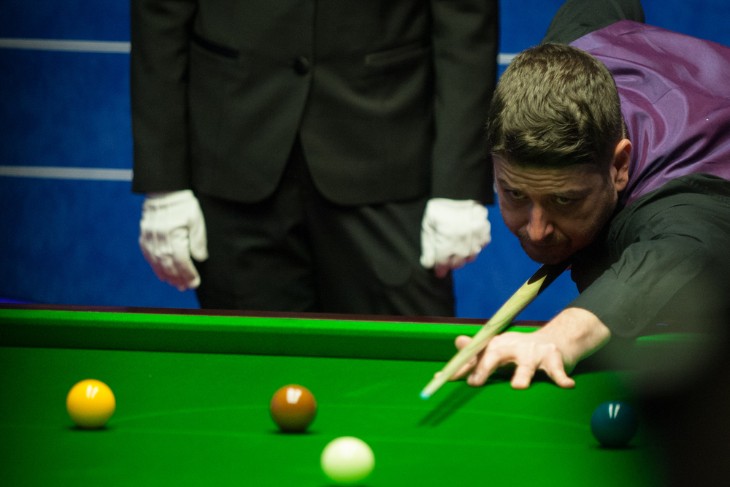- The Impact of Different Snooker Tournament Formats on Betting Strategies
- Knockout Tournaments: Expect the Unexpected
- Knockout Tournaments: High Stakes and Unpredictable Outcomes
- Round-Robin Formats: Predictability and Consistent Performance
- Long-Format Matches: Endurance and Mental Strength
- Short-Format Matches: Speed and Adaptability
- Impact of Venue and Crowd on Players' Performance
- The Role of Frame Count in Betting Decisions
- Understanding Player Styles and Matchups in Different Formats
- Bottom Line
In snooker betting, the tournament format is key. Different formats affect how games play out, changing your betting strategy. For example, knockout tournaments, where losers are immediately out, can lead to surprising upsets.
This means higher risks but potentially big rewards in betting. Round-robin formats, where players face multiple opponents, offer more data on player performance. This can lead to safer but less lucrative bets. Knowing these formats helps you bet smarter in snooker.
The Impact of Different Snooker Tournament Formats on Betting Strategies
Different snooker tournament formats can greatly change how you should bet. Each format has its unique aspects that influence betting strategies.
[promotion:173]
Knockout Tournaments: Expect the Unexpected
In knockout tournaments, players get eliminated after each loss. This format can lead to surprising results. Top players might get knocked out early, creating opportunities for underdogs. For bettors, this means higher risks but also the chance for big rewards. It's wise to watch for potential upsets, especially in early rounds.
Round-Robin Formats: Consistency is Key
Round-robin tournaments have players compete in groups, with the best performers advancing. Here, you can see how players do over several games. This format helps bettors gauge a player's consistency. Betting in round-robin tournaments can be safer. You base your bets on players who show steady performance.
Short vs Long Matches: A Question of Stamina
Match length also matters. Longer matches test players' endurance. In these, experienced players who can maintain focus are usually safer bets. Shorter matches are more unpredictable. They often favour players who can quickly adapt and take bold risks. When betting, consider a player's history in match lengths.
Venue Effects: Home Advantage Matters
Where a tournament takes place can also affect betting. Players in their home country might perform better thanks to familiar settings and crowd support. Betting on these players can be wise, especially when they show strong home records.
Frame Count: More Frames, More Predictability
The number of frames in a match influences its predictability. Matches with many frames allow for comebacks and reduce the chance of upsets. In these, betting on favoured players might be safer. In shorter frame matches, the risk of an upset is higher. Here, betting on underdogs might offer greater value.
Knockout Tournaments: High Stakes and Unpredictable Outcomes
Knockout tournaments in snooker are exciting but unpredictable. In these tournaments, players compete in one-on-one matches. The loser of each match is out, and the winner moves on. This format makes every game high stakes.
One key feature of knockout tournaments is their potential for upsets. Even top players can be eliminated early if they have an off day. This unpredictability makes betting on knockout tournaments both risky and thrilling. For bettors, it means there's always a chance for underdogs to surprise everyone.
In the early rounds of a knockout tournament, the chance of upsets is higher. Top players might face lesser-known opponents. These matches can go either way. It's wise to look at players' recent performances before betting. A top player in good form is less likely to be upset.
As the tournament goes on, the matches often get tougher. The remaining players are those who have won their earlier rounds. This can make predicting outcomes in the later stages a bit easier. However, the pressure also increases, which can affect players' performances.
Another thing to consider in knockout tournaments is players' mental strength. Players who can handle pressure well often do better in this format. When betting, it's good to pick players known for their mental toughness, especially in crucial matches.
Knockout tournaments also often have higher rewards for winning bets, especially on underdogs. This can be tempting, but it's important to bet wisely. Balancing the potential high reward with the risk involved is key.

Round-Robin Formats: Predictability and Consistent Performance
Round-robin formats in snooker tournaments bring a different set of dynamics compared to knockout tournaments. In a round-robin format, players compete in a group, facing each other in turn. The top performers from these groups then move on to the next stage. This format often leads to more predictable outcomes, which significantly influences betting strategies.
One of the key aspects of round-robin formats is the opportunity to observe players' performances across several matches. Unlike knockout tournaments, where a single bad day can mean elimination, round-robin allows players to recover and show their consistency over time. For bettors, this means they can make more informed decisions based on each player’s performance trend.
The predictability in round-robin formats comes from the ability to gather more data on each player. Bettors can analyze how players adjust their strategies against different opponents and how they handle the pressure of consecutive games. This in-depth analysis can lead to safer betting choices, as bets can be based on a broader understanding of each player's capabilities and form.
However, it's important to note that while round-robin formats may offer more predictability, they are not without surprises. Players might perform inconsistently, or unexpected outcomes can still occur, especially in closely matched groups. Therefore, bettors need to keep a close eye on all matches within the group to gauge the true form of the players.
In round-robin tournaments, looking at players' historical performance in similar formats can also be beneficial. Some players perform exceptionally well in round-robin formats due to their ability to maintain a high level of play throughout multiple matches. Identifying such players can be a key strategy in placing successful bets.
Long-Format Matches: Endurance and Mental Strength
In snooker, long-format matches are a true test of a player's endurance and mental strength. These matches, often part of major tournaments, require players to maintain high levels of concentration over extended periods. For bettors, understanding the demands of these long-format matches is crucial for making informed betting decisions.
Long-format matches can consist of several frames, sometimes stretching over multiple sessions. This format favours players who not only have exceptional skill but also the stamina and mental fortitude to perform consistently over time. When betting on these matches, it's important to look at players' track records in similar long-format situations. Players who have a history of doing well in long matches are often safer bets.
In these lengthy battles, the physical and mental demands on players are intense. Fatigue can set in, affecting concentration and decision-making. Some players excel in these conditions, showing their ability to stay focused and make precise shots, even under pressure and fatigue. Bettors should watch for players known for their endurance and mental toughness, as these qualities are key in long-format matches.
Another aspect to consider is a player's ability to manage the game's pace. In long-format matches, players who can control the table and manage the tempo often have an advantage. They can dictate the flow of the game, putting pressure on their opponents. This control can be a deciding factor in the match's outcome.
The psychological aspect of long-format matches also plays a significant role. Players must remain mentally resilient, especially when facing setbacks. A strong mental game can mean the difference between a comeback and a collapse. Bettors should be aware of players' psychological strengths and weaknesses when placing their bets.
Short-Format Matches: Speed and Adaptability
Short-format matches in snooker bring a different kind of excitement and challenge, both for the players and for bettors. These matches are quick, often involving fewer frames, which means each shot and each frame carry more weight. In such formats, the ability to adapt quickly and make fast decisions is crucial for players.
For bettors, these matches can be tricky to predict. The quick nature of the game increases the chance of unexpected results. Players who may not excel in longer formats can shine here, using their quick thinking and aggressive play to their advantage. When betting on short-format matches, it's important to consider players' ability to handle quick changes in the game and their knack for taking bold risks.
In these matches, a player's starting performance is often more critical than in longer formats. A strong start can set the tone for the rest of the match. Players who are known for their quick starts are often good bets in short-format games. Similarly, players who usually take time to settle into a match might be riskier choices.
The adaptability of players is also key in short-format matches. Players who can quickly read the table and adjust their strategies accordingly tend to perform better. This adaptability includes responding to opponents' plays, adapting to table conditions, and managing the psychological pressure of rapid gameplay.
Furthermore, in short-format matches, the element of surprise can be a decisive factor. Players with unconventional styles or unexpected tactics can upset more predictable opponents. Bettors should look out for these dark horses, who can turn the odds in their favour with surprising plays.
[promotion:1149]
Impact of Venue and Crowd on Players' Performance
The venue and the presence of a crowd can greatly affect players' performance in snooker matches. These factors, often overlooked, play a significant role in shaping the outcomes of games and, consequently, betting strategies.
First, consider the venue. Playing in a familiar location can provide a comfort advantage. Players familiar with the lighting, table conditions, and overall environment of a venue often feel more at ease. This comfort can translate into better performance. When betting, it’s wise to note where the match is taking place and if any players have a strong track record at that specific venue.
The crowd's influence is also crucial. A supportive crowd can boost a player's morale, especially in tight situations. Players often feed off the energy of the crowd, which can lead to improved performance. In contrast, a hostile crowd can increase the pressure on players, particularly visiting competitors. This pressure can affect their focus and decision-making.
Home advantage in snooker is a well-known phenomenon. Players competing in their home country or region often perform better, buoyed by local support. The familiarity with the venue and the encouragement from the home crowd can provide a psychological edge. Bettors should consider this when placing bets, especially in international tournaments.
However, the home advantage can also bring added pressure. Local players may feel the weight of expectation from their home crowd. This can sometimes lead to increased anxiety and affect performance. Bettors need to assess how well players handle pressure, especially in front of a home crowd.

The Role of Frame Count in Betting Decisions
The number of frames in a snooker match, known as frame count, is a crucial factor in betting decisions. It influences the pace and strategy of the game, which in turn affects how players perform. Understanding the role of frame count can help bettors make more informed choices.
In matches with a high frame count, players have more opportunities to score and recover from mistakes. These matches tend to be less volatile and offer a clearer picture of a player's skill and consistency. For bettors, this means a lower risk of unexpected upsets. When betting on high frame count matches, it's usually safer to bet on the player with a stronger overall track record.
Conversely, matches with a low frame count are more unpredictable. In these games, every frame carries more weight, and a few mistakes can drastically change the outcome. This setup often benefits players who are good at quick starts and can maintain high levels of concentration in short bursts. When betting on low frame count matches, there's more potential for upsets, making them riskier but also potentially more rewarding.
Bettors should also consider players' styles and strengths. Some players excel in long, strategic games, while others perform better in quick, high-pressure matches. Knowing a player's history and how they fare in different frame count scenarios is valuable information for placing bets.
Moreover, the frame count can affect a player's mental and physical stamina. Longer matches require endurance and the ability to stay focused for extended periods. Players known for their stamina and mental resilience are often better bets in high-frame count matches.
Understanding Player Styles and Matchups in Different Formats
In snooker betting, knowing players' styles and how they match up in different tournament formats is key. Each player brings a unique style to the table, and these styles can have varied impacts depending on the format of the tournament.
Some players are known for their aggressive play. They take bold shots and try to dominate the game quickly. This style can be especially effective in short-format matches where taking risks can pay off quickly. Bettors should look out for these aggressive players in fast-paced tournaments, as they can often pull off surprising wins.
On the other hand, some players excel in strategic play. They are patient, think several shots ahead, and are good at controlling the pace of the game. In long-format matches, where endurance and strategy play a huge role, these players often have the upper hand. Bettors should consider backing these strategic players in tournaments with higher frame counts.
Matchups are also crucial. How one player's style fares against another can greatly influence the outcome of a match. For example, an aggressive player might struggle against a strategic player who can effectively counter their bold moves. Before placing bets, it’s wise to consider past encounters between players and see how their styles clashed.
The adaptability of players is another factor to consider. Snooker is a dynamic game, and players often need to adjust their styles mid-match. Those who can adapt quickly to their opponents' strategies and the changing conditions of the game are often more successful. Bettors should watch for players who have demonstrated this adaptability in past tournaments.
[promotion:1150]
Bottom Line
In conclusion, successful snooker betting hinges on understanding tournament formats. Each format brings its own set of rules and challenges that influence players' performances. Bettors must consider factors like match length, player styles, and frame count.
Recognizing how these elements interact in different formats is crucial. By doing so, bettors can make informed decisions, improving their odds of winning bets in the exciting world of snooker.
For more information:





 (1).webp)






.webp)















